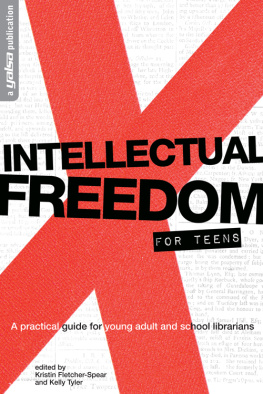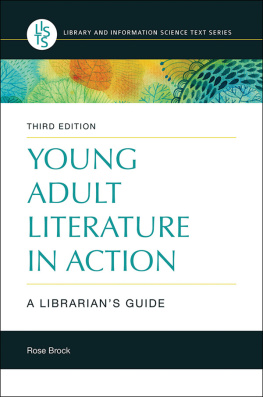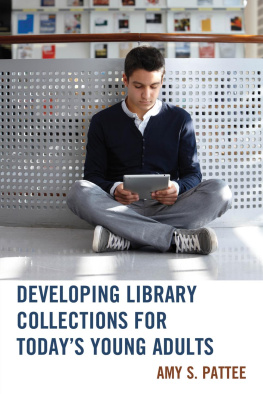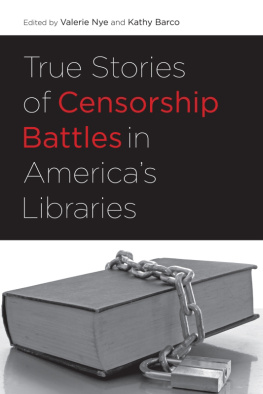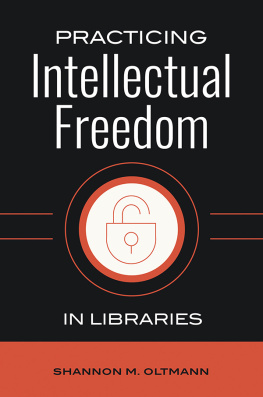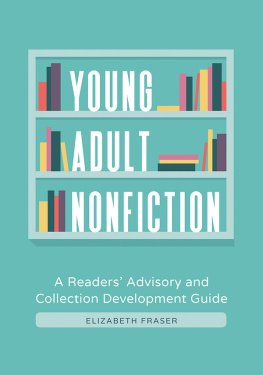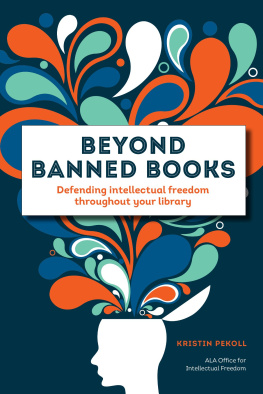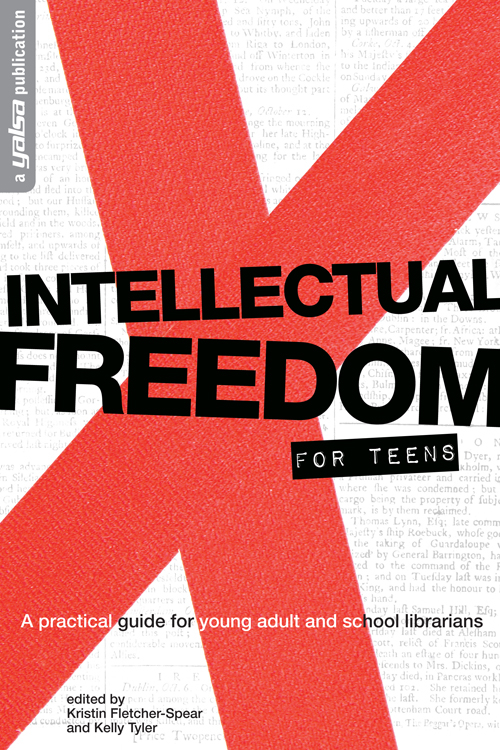
ALA Editions purchases fund advocacy, awareness, and accreditation programs for library professionals worldwide.
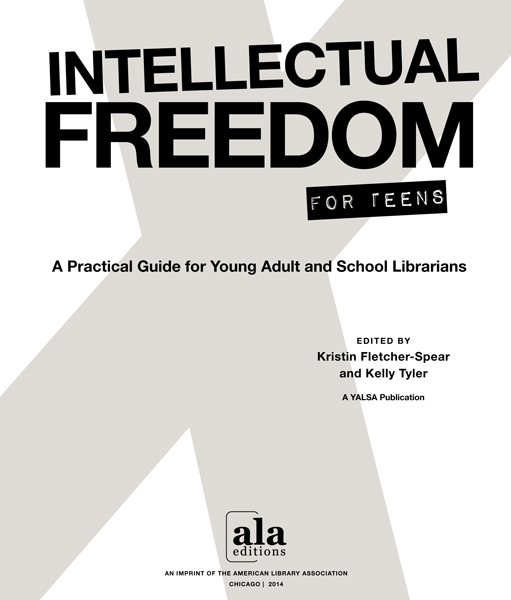
Kristin Fletcher-Spear is the administrative librarian at the Foothills Branch Library in Glendale, Arizona. She is coauthor of Library Collections for Teens: Manga and Graphic Novels and has written for YALSA, VOYA, and Library Media Connection. She earned her masters degree in library science at Indiana University.
Kelly Tyler is the branch manager for the Van Nuys Branch at the Los Angeles Public Library. Prior to becoming a supervisor, she worked as a youth services librarian and was a mentor and trainer for new teen librarians. This is her first book.
2014 by the American Library Association
Extensive effort has gone into ensuring the reliability of the information in this book; however, the publisher makes no warranty, express or implied, with respect to the material contained herein.
ISBNs
978-0-8389-1200-3 (paper)
978-0-8389-1252-2 (PDF)
978-0-8389-1253-9 (ePub)
978-0-8389-1254-6 (Kindle)
Library of Congress Cataloging-in-Publication Data
Intellectual freedom for teens : a practical guide for young adult and school librarians / edited by Kristin Fletcher-Spear and Kelly Tyler.
pages cm
A YALSA publication.
Includes bibliographical references and .
ISBN 978-0-8389-1200-3 (alk. paper)
1. Young adults librariesCensorshipUnited States. 2. School librariesCensorshipUnited States. 3. Intellectual freedomUnited States. 4. Prohibited booksUnited States. I. Fletcher-Spear, Kristin, editor of compilation. II. Tyler, Kelly, editor of compilation.
Z718.5.I58 2014
027.62'6dc23 2013051234
Cover design by Kimberly Thornton. Images Shutterstock, Inc.
Contents
Mary K. Chelton
Kristin Fletcher-Spear
Kelly Tyler
Karen Jensen
Linda Braun
APPENDIXES
I DEDICATE THIS TO my mom, Kay Fletcher, who gave me the foundation that fostered my passion of intellectual freedom. I thank Howard Rosenbaum at Indiana University. Without his intellectual freedom course at Indiana University, I would have floundered in the IF issues Ive had in my career. Jason, thank you for all the love and support. You and our kids are my life.
Kristin
Ken, you are my partner in life and work. Thank you for giving me time, your keen librarians eye for detail, and boundless moral support while I was working on this book and my many other projects that dont offer an opportunity for me to show you public gratitude. Without you and Julian, life would be dull indeed.
Kelly
We also thank the authors who contributed chapters to this guide. Their expertise in their areas are what made them perfect candidates for their chapters: Stevie, Linda, and Karen, thank you for your dedication to this title and to teen library services.
Kristin and Kelly
Mary K. Chelton
I AM PLEASED TO see not only a new, updated edition of what should probably be considered a YA-professional classic, but also that the authors have taken an issue-oriented, contextual approach, recognizing both the similarities and differences between school and public libraries. It could have been easy to list all the titles of interest to young adults that have been challenged over the years, along with their reviews. This would have only perpetuated the myth that reviews can somehow save librarians under challenge or attack by censors. Often the title being challenged has never been reviewed with the YA audience in mind, or the age ranges for the title suggested by the reviewer do not support the age of the user on whose behalf the challenge is being made. In fact, the variation and possible inaccuracy in suggested age ranges across library review media could almost be viewed as an indirect contributor to challenges. Reviews may support the fact that the decision to purchase something for the collection that upsets the challenger was not arbitrary, but they are good for little else.
they are supposed to do for YAs, but disapproving adults and colleagues also notice what is in them; hence the concern over appropriateness, or in the school context, age-appropriateness. These discussions frequently attempt to sound like literary criticism, when they are really about political fear. I ran into this once with a seventh grade teacher who participated in a discussion of Sold by Patricia McCormick that I was leading for a local library system. Everyone in the group, including the squirming teacher (the only nonlibrarian in the group) who kept bringing up appropriateness, agreed that the book had an important theme (sexual trafficking), that kids would be interested in and like it, and that kids could read it, so I pointed out that this was a political problem, not an appropriateness problem. The urge to self-censor is probably as strong as the urge to run for the hills when challenged, but because it is often hard to predict what item, specifically, will set someone off, doing it for one title may just be self-defeating in some other way and may inevitably lead to a delusional complacency over challenges.
The necessity of having a materials selection policy should go without saying, but there are still librarians who feel that, if they do not let anyone know what they are doing, they can get away with it in perpetuity. Hammering out a policy that should include, among other provisions, how one purchases possibly controversial material for teens, and how the community can challenge items in the collection, is a clarifying professional exercise and usually quite helpful in explaining librarian decision making to the public (if it is not filed in a drawer immediately upon completion, which is often the case, or lost in a huge procedural manual). A selection policy should be immediately handy and available when staff members need to refer to it or use it in discussions with users.
Another use for the policy is in staff training, which the authors discuss in a section called Preparing Staff for Questions and Potential Challenges. If a librarys commitment to intellectual freedom is to succeed, the entire staff needs to be on board, from the janitor to the library/school board chair. It can be scary to be on the receiving end of an angry or upset challenger, especially if the staff member agrees with the objections presented, so there has to be lots of behind-the-scenes discussion and practice for responding interpersonally, as well as understanding when to refer a challenger to a higher level staff member, when to use a request for reconsideration form, or how to get the right tone into a written response. Intellectual freedom needs to be managed in such a way that it is part of the fabric of everyday library practice, not an occasional exercise in crisis management.
I have often said that, if it means the difference between having something available and being forced to censor it because of objections to the cover, take the cover off and keep the book. While I consider myself to be an intellectual freedom purist, meaning that people, regardless of age, should be able to pursue their interests in libraries without interference, the real world often does not allow it. One looks for the best pragmatic compromises, so I look forward to the potential solutions section in which will, no doubt, cover the tap on the shoulder of users viewing graphic sex on unfiltered computers, the ethics of temporary reserve shelves and parenting collections, and the joys of managing DVD collections for young adults rated by the Motion Picture Association of America. The American Library Association (ALA) Office for Intellectual Freedom (OIF) has vast information available on promulgating intellectual freedom in libraries as well as on what to do when something happens in the trenches of real life. OIF is prominent in the list of important resources provided in this book.
Next page
